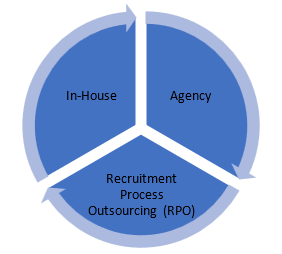
What Is..? The Recruitment Process
With Caroline Hunter – Talent Acquisition Leader with 20+ years experience in Agency recruitment, Consulting and RPO.
What is TA?
Talent Acquisition (TA) is the all-encompassing name for Recruitment+
Recruitment is the process of hiring a person for a job opening or vacancy.
TA tends to refer to a more strategic, long-term view of the whole process of attracting, engaging and hiring talent for an organisation. It includes recruiting people to fill open roles but also encompasses Employer Branding, Recruitment Marketing, Talent Pooling, the Candidate & Hiring Manager Experience, Diversity, Equity & Inclusion, Careers Site, Applicant Tracking System & CRM tools, Process Optimisation and Workforce Planning.
Therefore, for many organisations, especially the larger ones, ‘Recruitment’ is a part of ‘Talent Acquisition’.
CEOs are aware of the business imperative to diversify their workforce. They are turning to previously marginalised talent pools to fill the labour force gaps, companies need to better reflect their customers & buyers to maintain competitiveness.
Therefore, Diversity, Equity and Inclusion initiatives are a business imperative. Veteran hiring (meaning veterans, cadet, reservists, military spouses and families) is a huge part of this.
In the UK we are slowly cottoning on to the rich talent pool the ex-forces population represents and more organisations are interested in accessing it. I can assure you there’s no “pity hiring” in large, corporate organisations – diversity hiring initiatives are driven by the need to secure top talent ahead of their competitors!
How do companies recruit?
TA/Recruitment departments are usually set up in one of 3 ways (or with a blended approach):

1. In-House – this refers to recruiters who work directly for the employer, i.e. Google has a large team of permanent, direct employees who work in their TA department and fill their vacancies
2. Agency – such as Reed, Michael Page, Adecco, Manpower, Randstad, Hays, Korn Ferry Exec Search etc… Companies, usually small to medium sized, perhaps don’t have enough recruitment volume to warrant a full time in-house recruitment team or need it supplemented, engage one of these 3rd party agencies to find candidates for them and pay them a per placement fee when the candidate is hired. Agency recruiters tend to work with several companies at the same time, placing candidates wherever they find a good match (and the best rate!). (I started my career in Agency recruitment)
3. RPO (sometimes known as embedded) – i.e. Alexander Mann Solutions (AMS), Korn Ferry RPO, IBM Kenexa. About 15 years old, this industry is rapidly growing as it offers larger organisations predictable costs for their hiring needs. Companies outsource their whole Talent Acquisition function to a specialist provider in multi-year sometimes multinational contracts worth millions of $. The RPO works on behalf of the company with teams of recruiters branded as the end employer – if you speak to them you are likely to think they ‘are’ the end client as they are fully embedded in the company and working as though they were an in-house team, just paid by the RPO rather than the client. GSK, Jaguar Land Rover, Imperial Tobacco and BP work with RPOs to hire thousands of employees every year.
Why is it important to understand this when searching for a job?
How a recruiter is employed influences how they are targeted and rewarded and therefore often determines how they will operate. Knowing who you are interacting with will help you to understand their processes and how to work with them most effectively.
An Agency Recruiter is likely to be paid a lower base salary with high commission for each candidate they successfully place. They will sometimes have access to jobs that are not advertised elsewhere (i.e. they have ‘exclusivity’). An Agency Recruiter may work with a particular client on multiple vacancies over many years and therefore get to know the company really well. Or, this may be the first time they’ve worked with them and they have little (if anything!) more than the Job description to go on. Agency Recruiters are usually a great source of market insight as they work with many different clients and have their fingers on the pulse re. who is hiring, what the going rates are etc…
In-House & RPO Recruiters tend to earn less overall & have less of a commission/bonus structure. They are measured on filling their roles quickly and with quality, good fit candidates who will stay with the organisation for the long term. They tend to be more invested in the organisation they work with and will likely be more knowledgeable about their employer, the culture, benefits packages, career paths available etc… than an external agent could be. They will be able to help you with applying for a job at the company they work for but are unlikely to be able to help much beyond that.
Should you work with a Recruiter or apply to a role directly?
If introduced to a role by an agent it is best not to circumvent them and apply directly – this will certainly cause a breakdown in trust and the agent is unlikely to want to represent you again.
No agency should ever submit your details to a client without your express consent (GDPR) and they should not withhold the name of the client from you.
Having an Agent represent you can be really helpful, especially when it comes to negotiating compensation packages & Ts & Cs. In some circumstances, it can be easier to provide & receive feedback via a 3rd party and useful to have an agent as your confidant/coach and advisor.
